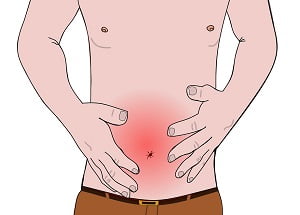People With Higher Risk of Food Poisoning
- Updated on: Jul 5, 2024
- 4 min Read
- Published on Nov 20, 2021

Food poisoning is a condition that can occur in anyone who consumes food contaminated by bacteria, viruses, or parasites. After a few hours of eating the contaminated food, the person may develop symptoms like nausea, vomiting, headache, diarrhea, abdominal cramps, weakness, and fever. Food poisoning can occur in any person, but certain groups of people are particularly prone to this condition.
Which People Are at High Risk of Food Poisoning?
Certain groups of people are at a high risk of food poisoning because they may have a low immune response or are in stressful conditions. These groups involve infants, young children, pregnant women, older people, and people with chronic diseases.
Children
Babies and young children, especially those under the age group of 5 years, may experience food poisoning complications because their immune system is not well developed and is not sufficient to fight against bacterial or viral infection. In children, stomach acid secretion is low compared to older people, making them unable to kill the bacteria causing food poisoning. Children have very limited control over their diet, and they eat ice creams, jellies, chocolates, snacks that may be contaminated, leading to a higher risk of developing food poisoning.
Children affected by food poisoning may develop symptoms like diarrhea, vomiting, extreme thirst, dizziness, abdominal cramps, fever, and appetite loss. A commonly found causative agent of food poisoning in children is Escherichia coli, which may lead to serious complications like hemolytic uremic syndrome if the infection persists for a long time.
Pregnant Women
During pregnancy, many hormonal changes occur in women, affecting their immune systems and making them more susceptible to food poisoning. It is very common during pregnancy to have morning sickness, but sometimes this may be due to food poisoning.
The symptoms that occur due to food poisoning in pregnant women include headache, dizziness, nausea, vomiting, and diarrhea. Food poisoning in pregnant women is most commonly caused by organisms like Listeria, Salmonella, Escherichia coli, and Toxoplasma gondii.
Among all these organisms, Listeria is the most common organism that leads to food poisoning (Listeriosis) in pregnant women. This organism can pass from pregnant women to unborn babies and may lead to miscarriage, premature birth, immature birth, or low weight baby birth. All these conditions may cause serious life-threatening health issues to newborn babies, including bacteria in the blood (bacteremia), meningitis, and other chronic conditions related to the heart, kidney, and brain.
Older People
People above the age of 60 years are more likely to have food poisoning because their bodies do not work as efficiently as it used to be when they were young. The organ systems of older people lose their efficiency to function properly, and their body metabolism also becomes slow. Following are some of the factors that make older people more prone to food poisoning:
- The digestive system of older people is slow due to which their stomach holds food for longer. This, in turn, increases the bacterial growth in the body.
- Low secretion of acid by the stomach, which is insufficient to kill the bacteria.
- The inability of the liver and kidneys to remove toxins from the body.
- Reduced ability to smell and taste the food due to which they are unable to recognize the spoiled food.
- Presence of serious chronic diseases such as diabetes, heart diseases, arthritis, etc that are responsible for reducing the efficiency of their immune system.
People With Chronic Diseases
People suffering from chronic diseases like cardiovascular diseases, diabetes, liver diseases, cancer, and autoimmune deficiency syndrome (AIDS) are more likely to get food poisoning. For chronic conditions, these people usually take medical treatments such as chemotherapy, radiation therapy, and immunosuppressive therapy, which suppress their immune systems and make them more susceptible to microbial infections. Following are some of the risk factors associated with people suffering from chronic diseases:
- If you have diabetes, there will be a high glucose level in the blood, which suppresses white blood cells (WBCs) to fight against infection-causing microorganisms and make you susceptible to food poisoning.
- People who have AIDS are more likely to develop food poisoning because HIV reduces the immune system’s efficiency and makes them prone to food poisoning.
- People suffering from chronic kidney disorders can easily develop food poisoning because their kidneys cannot release the body toxins and therefore hold the germs for a longer duration.
- People who have undergone organ transplantation are often given immunosuppressant drugs to prevent organ rejection. These drugs suppress the immune system and make people more susceptible to foodborne infections.
How to Prevent High-Risk People From Food Poisoning?
Following are some of the measures that can be taken for preventing high-risk people from food poisoning:
- Before and after a meal preparation wash your hands properly with soap and water.
- Rinse all the fruits and vegetables under the running water to drain out the bacteria from their surfaces.
- Cook their food at the right temperature (above 60? C).
- Always make sure that the food is completely cooked.
- Keep your groceries in the refrigerator and never leave perishable foods out for more than 1 hour.
- Avoid buying rusted or damaged food cans.
- Avoid serving them foods associated with food poisonings like unpasteurized milk, shellfish, sandwiches, leftover food, raw sprouts, and soft cheese.
FAQs
Does Food Poisoning Affect Pregnancy?
Yes, food poisoning can affect pregnancy. During pregnancy, some hormonal changes occur in the women which leads to weakening of the immune system, and therefore, it will not able to destroy microorganisms which cause food poisoning. Food poisoning in pregnant women may lead to some severe complications like miscarriage, premature birth, stillbirth, and the baby born with chronic diseases.
How Do I Know if I Have Food Poisoning During Pregnancy?
You may observe the following symptoms if you have food poisoning during the pregnancy:
- Headache
- Nausea
- Vomiting
- Diarrhea
- Dizziness
- Fever
- Abdominal ache
- Blood in stools
Why Are the Elderly More Prone to Food Poisoning?
The elder people are more susceptible to food poisoning because the immune system usually becomes weaken as people become old and metabolism also slows down. These people may have low stomach acid secretion which is not sufficient to kill microorganisms and their digestive system can hold the food for a long time. It leads to an increase in bacterial growth in the stomach that can cause food poisoning.
Can Food Poisoning Last For Months?
Food poisoning symptoms such as diarrhea, nausea, vomiting, fever, and headache usually start to appear within 2-10 days. Its recovery period depends on which microorganism is causing food poisoning. For example, Clostridium perfringens causes food poisoning that lasts for 24 hours. On the other hand, food poisoning symptoms due to Cryptosporidium can last for a few weeks and months.












